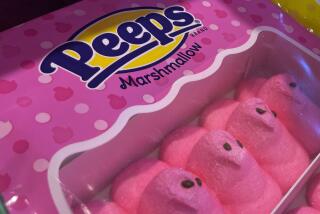Penn Serves Dye-Free Ball Into Dog-Toy Market
- Share via
The carpet in Paul and Jane Stickney’s home is much cleaner these days now that their beloved black Labrador retriever isn’t chasing and chewing yellow tennis balls.
Dye from the balls, mixed with the dog’s slobber, used to leave lemon-colored stains around their home in suburban St. Louis. On a recent trip to the pet store, Jane Stickney bought a sleeve of Fetchem’s--dye-free tennis balls for dogs made by Penn Racquet Sports.
“It’s a great product. The dog likes them, that’s the only way I can judge it,” Stickney said. “I just know we don’t have yellow dye bleeding on the carpet anymore.”
Dogs have been chasing Penn tennis balls since they first rolled off the assembly line in 1910. A customer once sent in a photo of his dog holding three tennis balls in its mouth, the Penn logos in perfect alignment.
For years, Penn, based in Phoenix, sold factory seconds to firms that made them into pet toys or novelty gifts for humans. But it wasn’t until interest in recreational tennis, and Penn’s profits, hit bottom in the mid-1990s that the world’s largest tennis ball manufacturer seriously considered entering the $40-million dog-toy market.
According to the Tennis Industry Assn., recreational play is down about 20% in the past decade, while sales of tennis balls have fallen 29% since 1991. Penn’s sales, estimated at $70 million, have been mostly flat since reaching an all-time high in 1991-92, said Mike Curtis, Penn’s director of marketing and international sales.
Many young people have hung up their rackets to pursue “extreme” sports like snowboarding and in-line skating, he said. But the company is confident that tennis will eventually make a comeback.
“You may not go snowboarding when you’re 40. You may pick up a tennis racket or a golf club, and the social aspects of it are always there,” Curtis said.
Penn executives don’t expect the off-white Fetchem’s to surpass the company’s “optic yellow” tennis balls in sales. But the novelty balls for canines could eventually account for 10% of sales, Curtis said.
“It’s definitely a substantial market. Dog owners outnumber tennis players 10 to 1, if not more than that,” he said.
A package of Fetchem’s contains two balls and carries a suggested retail price of $4 to $5. Regular yellow Penn tennis balls, by comparison, come three to a pack and retail for $2 to $3.50.
PetsMart Inc. is the biggest retailer of Fetchem’s. PetsMart ordered 400 cases of Fetchem’s for its 413 stores, but the balls have only been on shelves a few weeks, so it’s a little early to judge sales, company officials said.
“It’s something unique and different, and I think [consumers] like the idea of something different just for pets,” said Greg Forquer, vice president of merchandising for Phoenix-based PetsMart.
The balls bear the familiar red checkerboard logo of pet food giant Ralston Purina, Co., which has a trademark licensing agreement with Penn. The small square of red ink won’t smudge or otherwise harm dogs, Curtis says.
Ralston Purina Co., based in St. Louis, tossed the dye-free balls to dogs at its test farm before giving its blessing to Penn to market them. The deal marks Ralston’s first foray into the pet-toy business.
“The fact that they are dye-free and don’t stain really makes it a better alternative than the current colored tennis ball,” said Jim von der Heydt, Ralston’s executive vice president of pet products.
Fetchem’s also were a hit at the birthday bash that New York City parks commissioner Henry Stern throws each summer for his prized 7-year-old retriever, Boomer the Wonderdog. Boomer and 63 other dogs wore birthday hats as they dashed after the tennis balls in a city park in July.
“Tremendously popular,” Stern spokesman Dan Laureano said of the toy, donated by Penn’s advertising agency.
More to Read
Sign up for Essential California
The most important California stories and recommendations in your inbox every morning.
You may occasionally receive promotional content from the Los Angeles Times.













